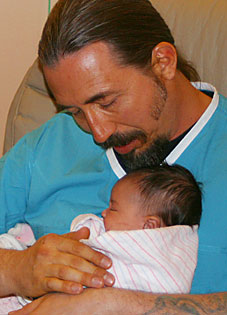 |
|
EMILY REID/Arizona Daily Wildcat
|
Hospital volunteer David Conrad holds baby Sara Jeanette Kasperowicz yesterday in the UMC's newborn intensive care unit.
|
|
By Devin Simmons
Arizona Daily Wildcat
Wednesday February 12, 2003
David Conrad's life became clear to him a few years ago as he sat at a picnic table and listened to a pregnant woman, who was smoking a crack pipe, complain about her children being taken from her.
He now works to give babies who were born under these conditions or who have other medical problems, extra attention.
After his experience in the park, Conrad, 49, found his way to the neo-natal intensive care unit at University Medical Center, where he has served for four and a half years in the hospital's Cuddler program.
The program recognizes that babies need to be touched, held, and comforted while in the unit, said Dagmar Cushing, a social worker in the unit.
But nurses often find themselves overwhelmed by other concerns and are unable to give babies the kind of direct attention that they need, Cushing added.
"There are people who hear about what I do and they say that they admire me," Conrad said. "But the truth is that all I really do most of the time is sit in a rocking chair and hold a baby."
If you want to volunteer to be a Cuddler at UMC, contact Cynthia Rowe at 694-6706.
|
As a Cuddler, Conrad does everything from singing songs and playing games with the babies to rocking them to sleep and washing their dirty laundry.
"We always have to keep the linen stocked with blankets and spit cloths," Conrad said. "Babies tend to leak a lot from all ends."
The unit, which has a maximum of 30 beds, cares for babies that suffer from a number of birth defects, such as premature birth, exposure to substance abuse and natural medical difficulties.
Babies stay in the unit for anywhere from three days to four months, depending on their condition, Cushing said.
Billie Jean Kasperowicz, whose daughter, Sara Jeanette, was born Jan. 30, is scheduled to leave the unit in a couple days. Sara was born at Northwest Hospital and sent to UMC after doctors discovered she had acid-reflux disease.
"She has done so much better since being here," Kasperowicz said. "The care has been absolutely amazing."
Though the program is always looking for volunteers, Cushing stressed that it's not for everyone.
"Some volunteers don't last long," Cushing said. "It is a very rewarding program, and there are many, many positive moments. But you are also dealing with human sadness. There are some sick babies; some babies die. It takes a certain level of maturity."
Conrad said his experiences have led to some "emotional weathering."
He recounted an instance involving a newborn in need of a kidney transplant. The baby stayed in the intensive care unit for 10 months waiting for a donor. Conrad became attached to the infant, wheeling her bed out to the patio so she could feel the sunshine on her face. But the donor never came, and she eventually died.
"Everybody in the unit loved her very much," Conrad said. "You watch these kids grow, become little people, and then when they die, you cry a little, you go to the funeral."
Conrad said that often the hardest thing about the service is dealing with the families who lose their children, but that the positive benefits of the job outweigh the difficult times.
He said the most rewarding thing is watching a family leave with a healthy baby and knowing that in some small way he played a part in making sure the baby could go home.
Conrad, who was in a major motorcycle accident 12 years ago that limited his ability to work, joined Cuddlers because he wanted to serve people. He believed children were the most in need.
"It's an ugly world," Conrad said. "Children so often are the ones that fall through the cracks, or get the short end of the stick."
There are a number of different motivations for people who choose to become Cuddlers, Cushing said.
Some volunteers are grandparents who want to experience the joy of holding a baby again. Others are parents who have had sick children of their own and want to give back to hospitals. Several UA students, especially medical students, use the program to gain experience.
"What some students might not realize is that this program serves as a huge learning arena," Cushing said.
Students are needed most during the summer months when the older people have all gone back to cooler climates, Cushing added.
Anyone interested in volunteering in the program should call Cynthia Rowe, the volunteer coordinator at UMC, at 694-6706.
Volunteers must be at least 16 years old, and be able to commit to four hours per week for a minimum of one year. Cushing said that they are most in need of people to cover the late-night shifts.

